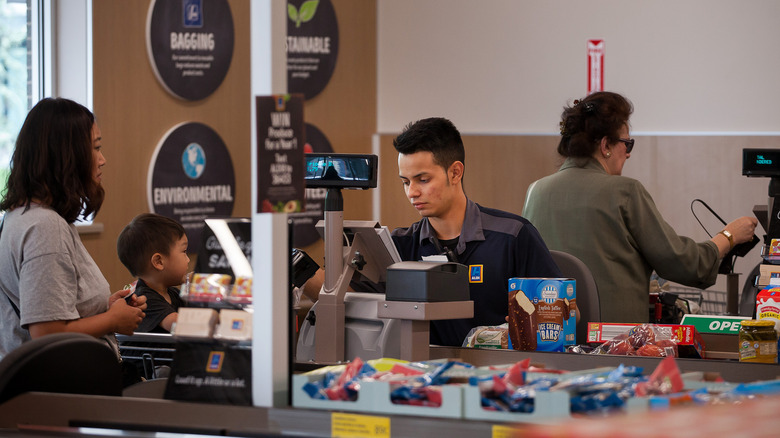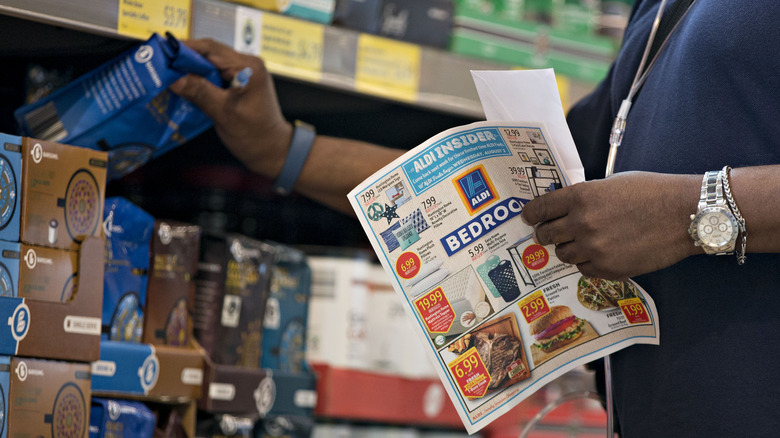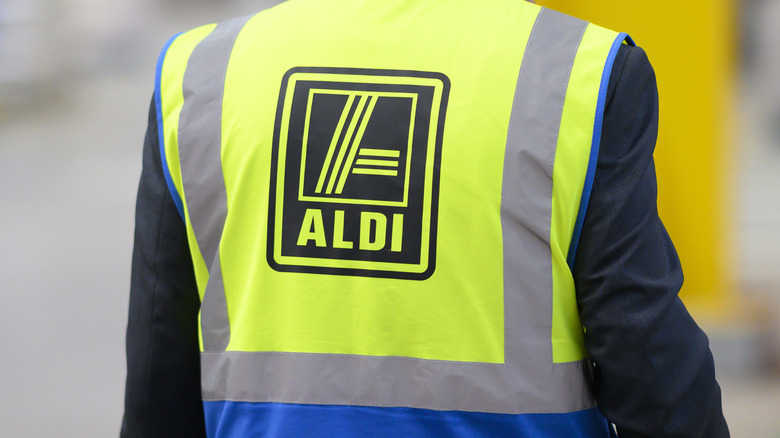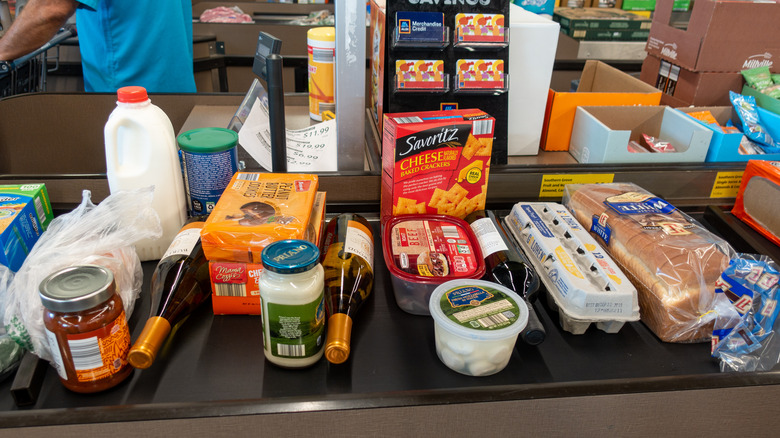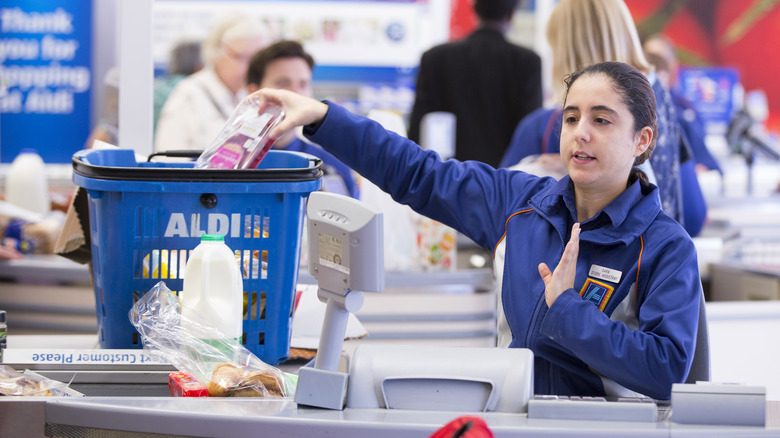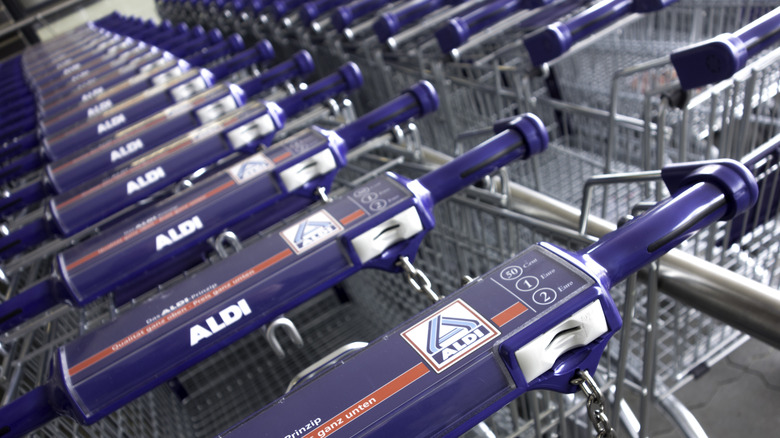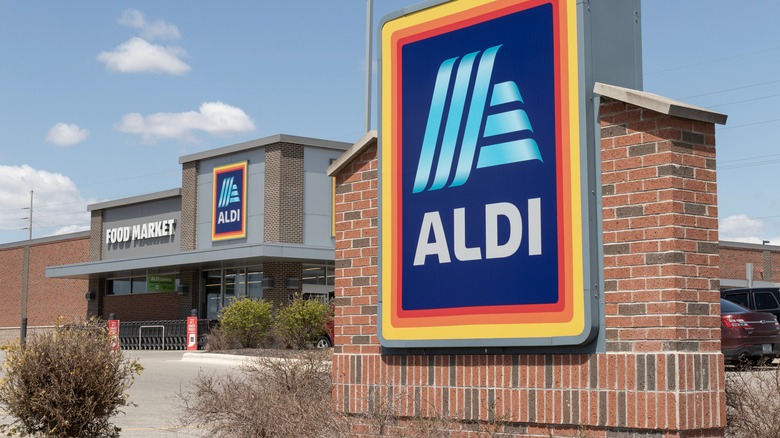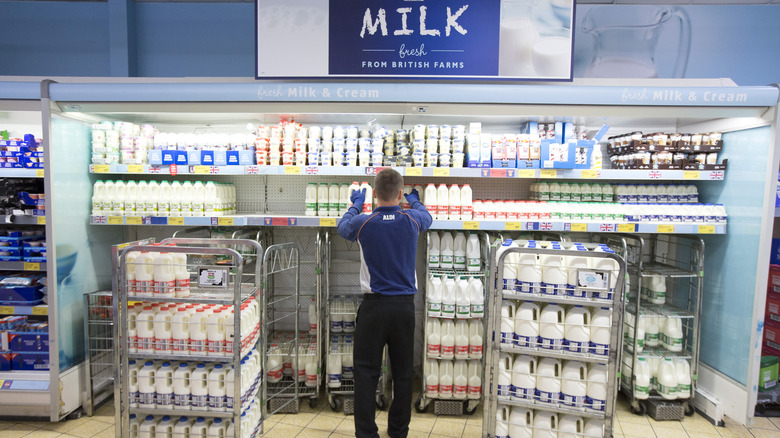11 Secrets About Being An Aldi Cashier, Revealed
Everyone has seen the memes: Aldi cashiers scanning groceries so quickly that customers need the speed of Flash Gordon to keep up with them. But did you know there is a very specific reason the workers have to move so quickly, under penalty of losing their jobs? The grocery store with German origins is just as famous for its super-fast cashiers as it is for them sitting down while on the job. However, just like the speed of the workers, getting to sit while scanning isn't all that it seems, either.
Some supermarket cashiers report that the amount of steps they walk totals nearly a half-marathon — and that's just one shift! From memorizing dozens of barcodes to quickly unloading trucks and pallets in the warehouse, there is a lot more that happens for cashiers at this grocery chain than you might think. Want to work at Aldi or just interested in a behind-the-scenes look? We scoured Reddit and personal interviews with current workers to bring you the best-kept secrets of being a cashier at Aldi, revealed.
1. There's a reason they scan groceries so quickly
Aldi cashiers are known for their lightning-quick scanning skills. So much so that the Internet is full of jokes about customers trying to beat the workers at their own game. However, there is a particular reason for their speed. "Please keep in mind while shopping at Aldi that the company functions on a hyper-micromanagement system," an employee spilled on Reddit. "Cashiers are timed for time BETWEEN customers, How long DURING each individual customer, AND whether or not you "pre-dipped" your card in the POS machine."
These metrics are meant to do two main things for the store. The first is to ensure the lines move quickly. The grocery chain is known for quick service and the management wants to keep it that way. Second, tracking how fast cashiers move guests through the line is also a big KPI in employee performance reviews. If a cashier doesn't hit the markers needed, they must improve. So next time you feel like you can't keep up with your Aldi cashier, remember that the number of things scanned per minute is a big part of keeping their job.
2. Aldi cashiers are allowed to work up to their lightning-fast speed
While each cashier's ring-up speed is an important part of their job performance, certain stores have exceptions for newer staff members. "As an ALDI shift manager, the only time we're going to get upset at someone is if their IPH is less than 90% after 2-3 months," a manager revealed on Reddit. "If you can't ring 90% and provide good customer service you're doing something wrong. There are cashiers at my store ringing 115% and 55 items per minute." This allowance ensures newer employees have time to learn the ropes before being subjected to intense performance reviews. "Even if somebody is ringing slow, we're not going to chew them up about it," they continued.
Instead, certain Aldi locations have IPH leaderboards posted in employee areas to encourage employees to work faster. If a certain employee sees their scanning times falling significantly behind their colleagues, management shared that they often self-correct and start speeding up without much coaching needed. Most employees might be unaware of how they stack up against the standard of Active Working Time without being told. Posting it on a board without calling anyone out is a shameless way to motivate them. "When I was new it kept me motivated and got me into the 90's with 45 items per minute within 3 weeks," the manager wrote. So not all cashiers start their first day with lightning-fast scanning speeds — it's an acquired skill, and one that can be constantly improved upon, too.
3. You will have to do way more than just ring up items
A big secret about being an Aldi cashier is that, unlike other retail jobs where you might work at the till the entire shift, the position involves a lot more than just ringing up items. "Our job is considered physically demanding, because Aldi has very few employees running per shift, meaning there are more expectations placed on each of us," Jonah, an Aldi worker from Pennsylvania, told Mental Floss. The store keeps a lean staff as a part of its business model. The fewer people working the floor, the fewer salaries to be paid –- and an overall better bottom line for the location.
So, while sitting down as an Aldi cashier might seem nice if there isn't anyone waiting to be rung up, you are not supposed to be at the register. "If you aren't ringing, you are expected to be cleaning, stocking, re-stocking, or organizing the shelves. There is no 'downtime,'" Jonah continued. Of course, if there is a long line you will spend most of the shift checking people out -– but you don't get a break from hard work if the store isn't busy. There is always plenty to do behind the scenes and it is the cashier's job to do it all. So if you are looking for an easy job where you just do one thing all day, being an Aldi cashier isn't for you.
4. You will always be on your feet
Now you know that Aldi cashiers only get to sit down when ringing up customers, but a big secret about the job is just how far employees actually have to walk while they are clocked in. "I walk over 10 miles a day each shift at Aldi," revealed one employee on Reddit. "[You] only sit down when there's [sic] customers." That's almost a half marathon per shift between duties — a far cry from taking it easy and sitting down all day as most customers think.
So if you currently work at another retail job and are jealous of the seemingly cushy life of an Aldi cashier, think again. The number of steps recorded by this employee isn't a fluke, either. "I averaged 20,000 to 30,000 steps a shift," a former cashier shared in an Indeed review. "You may not think it is a fast-paced job, especially if you have worked food like I have, but trust me you are always on the move and moving very very quickly," another told those wondering on Reddit. So not only are Aldi cashiers actually constantly on your feet, but they are running around, too.
5. You will be protected from rude customers
One of the hardest parts of working retail is being so customer-facing. You never know what kind of person you might encounter at work during a shift and whether they will be nice to you. However, an Aldi cashier revealed on Reddit that the grocery chain has a unique way of dealing with those hard-to-please customers.
"Every store has angry customers. In any retail job, you could do absolutely nothing wrong and customers will find something to be angry about," they wrote. "The good thing about Aldi is that we don't give a [...] about these customers." This is a far cry from the age-old "the customer is always right" adage other retail employees might be familiar with.
"If their anger is justified, then we fix the problem," the poster continued. This means that if someone can't use a valid coupon, if a product from the famed center aisle is defective, or if their quarter got swallowed by their shopping cart, a manager can step in to right the situation. However, "if they're angry over nothing, we don't care. And if a customer ever verbally or God forbid physically harasses an Aldi employee, your manager can and (if they're a good manager) will make them leave the store," they wrote. Working as an Aldi cashier, you know that you won't have to bear the brunt of an angry public, which is a perk.
6. There is a science to doing your job well
As cashiers learn to scan items quickly, there is a special technique they must pick up on to actually be successful. "There is somewhat of a science to this, as you don't want to be too rough and damage product," an Aldi shift manager advised on Reddit. "However, 90% of customers understand we work very quickly, and as long as you aren't putting bread on the bottom of the cart, you should be fine." The overall recipe is pulling heavier items for the conveyor belt first, so you can scan and toss them without causing damage. If you select eggs or bread first, you might damage them and anger the customer.
But what are cashiers supposed to do if the customer is taking too long to unload the cart? Knowing workers are timed to measure their efficiency, the manager had a few extra tips. "If your customer isn't going to be ready, even for a couple of seconds, hit your 1-code right away to stop your timer," he wrote. "Waiting for 10 [seconds] because the customer hasn't given you the next [cart] or they're asking questions or whatever is time just burned off your speed for something you can't control."
7. You might love sitting down at work, but it's for a good reason
Aldi cashiers getting to sit down to serve customers is the envy of retail employees across the country. However, there is a very calculated business reason behind the allowance — it's not just for employee comfort. "Employees can sit on stools while ringing guests up at a register, but getting a little rest isn't the sole reason for the seat," Aldi cashier Jonah told Mental Floss. "While [resting] is true, Aldi says that cashiers sit at the register because, according to their testing, it allows us to ring up items faster."
Everything that Aldi does is to save money and improve profits. The faster an employee can scan items, the quicker the line moves. The quicker the line moves, the easier the shopping experience is for the customer and the more likely they are to return. Plus, if there isn't a queue of people waiting to check out, the employee can then get up and attend to other tasks around the store.
8. You will always need to have a cart on hand
There is a special trick that all Aldi cashiers need to know when ringing up guests. They must always have a shopping cart on hand to store the scanned groceries because the register doesn't have a place to bag items. When asked about the hardest part of their job, an Aldi employee shared it was "the whole Aldi "system" of carts."
"You constantly have to make sure there's a cart at your register because it's your bagging area, but people always try to steal it anyway," they shared. "This also results in people constantly interrupting you to ask for quarters so they can get a cart."
Luckily, another employee, also familiar with the issue, shared the definitive solution that helpful guests can follow, so other cashiers don't have to suffer. "You get a cart (Cart A) from the corral. You shop, placing your items into Cart A. You unload Cart A onto the belt. The cashier rings them up and puts them into a different cart that was already near them (Cart B)," they wrote. "Once they're done, you take Cart B away from the cashier and replace it yourself with now-empty Cart A. You pack your bags away from the cashier and then return Cart B to the corral." This way, everybody wins!
9. You get more perks than the average retail employee
Working as an Aldi cashier comes with way more perks than an average retail employee. While sitting down on the job isn't the treat it seems to be from the outside, employees are quick to share about the other benefits that more than make up for it. "We also get many cool little perks," one shared on Reddit. "[We have] amazing healthcare, on-the-clock lunch break, dollar-an-hour bonus working on Sundays, paid holidays, etc. They definitely take care of you and reward you for your dedication."
An Aldi cashier's starting wage is indeed above the minimum wage in most states. Employees also get company 401(k) Matching Contributions, Short and Long-Term Disability Insurance, and dental insurance, too. When compared with other retail stores, like Walmart, for example — these types of benefits are only available to full-time employees. At Aldi, part-time workers get them, too. This is likely why the stores have such a low turnover rate, with the average employee staying with the company for over four years before moving on. However, those who do stay to enjoy the benefits do not do so without working extremely hard.
10. You have a lot of barcodes to memorize
To make the checkout process even faster, employees have a lot of barcodes that they must memorize. "Items like milk and water have codes that we memorize," Aldi cashier Sara told Mental Floss. "For example, someone could be buying six gallons of milk, and instead of having the customer put all of them on the belt for us to scan one by one, we tell them to leave them in their cart and we key in the codes, making the checkout process faster."
Some cashiers have methods for memorizing all of Aldi's unique products, like using flashcards as if they were studying for a test. Others insist that new hires should not be too worried about the barcodes. Instead, the knowledge will come through typing them in hundreds of times each shift. "It's all repetition before you know it the numbers will start resembling the produce," one wrote on Reddit.
In any case, there is typically a cheat sheet for the barcodes posted behind each register that cashiers can rely on in a pinch. After all, it is still faster to quickly look for the milk barcode and type it in, than to unload, scan, and reload six gallons of it.
11. Your experience depends on your management
Much like any workplace, the experiences of Aldi cashiers differ greatly depending on the management at their store's location. While some cashiers might report a strict environment that was draining to work in, others can't say enough great things about their bosses and coworkers. Some employees have worked in multiple locations, with the attitude of senior employees playing a significant role in whether or not they kept the job at that store.
When asked about the social environment as an Aldi cashier, one former employee wrote on Reddit, "True, there is not too much time to be socializing during store hours, but I became great friends with the entire store (only had 12 employees, which is about normal)." Unfortunately, the close-knit vibe of the store was short-lived. When they began working at a second location, the atmosphere was significantly different due to management. "When I transferred to a store in Massachusetts, I didn't have the same experience. The store wasn't run well and the management was poor so my time there was short and not enjoyable." So, while you might hear some secrets about Aldi being austere or a hard place to work, keep in mind that it heavily depends on the personalities of those working at that location.


